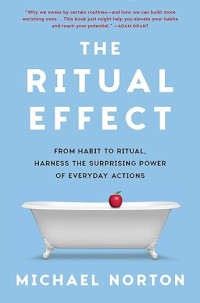Are there issues that you simply do in sure settings, at explicit occasions, that evoke a sense and remind you of what’s essential? After I step as much as bat in softball, I faucet the bat twice simply previous the plate, “squish the bug” with my again foot, and pinch the brim of my cap. I jiggle a ribbon with little charms on it that hangs from my rearview mirror earlier than beginning to drive—and extra vigorously after a close to miss. As month-to-month as I can handle, I stroll with my children and siblings to a particular hill to look at the total moon rise, eat spherical cookies, drink scorching tea from a thermos, and honor my late mom.

A 2002 article by Barbara Fiese within the Journal of Household Psychology concluded that individuals who engaged in additional routines and rituals felt extra competent at parenting and extra glad with their marriages, and had kids who have been extra well-adjusted. Different proof means that rituals carry individuals collectively via bodily synchronous behaviors, shared beliefs and aspirations, and a warmhearted mix of humility and customary humanity.
In his new ebook, The Ritual Impact: From Behavior to Ritual, Harness the Stunning Energy of On a regular basis Actions, Harvard Enterprise College professor Michael Norton shares the actual advantages to cultivating and repeatedly partaking in rituals. I spoke with Norton about what that appears like in our lives and at work.
Emiliana Simon-Thomas: What’s a ritual? How do you even outline the time period?

Michael Norton, Ph.D.
Michael Norton: The factor that involves thoughts if we are saying the phrase ritual is individuals in robes, candles, chanting, possibly within the mountains someplace. And people are rituals, for certain, however the type that I bought actually concerned about are primarily those which might be slightly extra on a regular basis, significantly those who we make up ourselves. They’re typically extraordinarily mundane, however we imbue them with a whole lot of which means.
The exact same boring process will be simply that—a process or a behavior—or if it takes on a particular which means, then it may begin to turn out to be a ritual. I used to be speaking to athletes the opposite day, and I requested them: “How do you tie your sneakers?” All of them had a really particular method of tying their sneakers, which shoe first and the laces and the way tight. After which I requested: “How do you’re feeling in case you do it a unique method?” They usually have been like: “I by no means have.”
Whenever you get extra emotion and extra which means, that’s when issues transfer away from a dry behavior—it’s extra than simply getting the factor executed. It’s the way you do it and the way you’re feeling about it.
EST: Why is having a ritual as a substitute of a behavior or routine useful? Why is it good for well-being?
MN: In case your habits are simply habits and also you simply undergo them like a robotic, each single day, all the time rise up at 6, then all the time go for this run for this period of time, all the time eat lettuce, no matter it is perhaps, it’s an impassive day. In case you lived an entire life like that, I believe you may look again and be like, I want I had executed extra various things than simply excellent habits.
Including ritual to these issues fills them with emotion. Hastily, tying your sneakers makes you’re feeling like “I’m gonna win this race!” However in case you can’t tie your sneakers the best way you need, then you definately really feel off. So you’ll be able to’t simply add rituals to life and then you definately’ll be joyful for the remainder of your days. Once we add rituals to our lives, they arrive with actual potentialities, but additionally some drawbacks. Rituals don’t all the time assist, and typically they will get in the best way.
There’s some very cool analysis on baseball gamers once they’re at bat. On common, this pattern of baseball gamers made 83 distinct actions earlier than every swing: touching their hat, adjusting their batting gloves and the bat, and all these items. They’re doing these rituals that they’ve been doing for years to really feel like, OK, I’m prepared. Now I can hit a 100-mile-an-hour fastball. That’s a tough factor to get amped up for. There’s a narrative of a baseball prospect and the scouts principally stated, “This man has so many pre-at-bat rituals that he can’t get out of his head.” In case you saved doing them whereas the pitch got here in, clearly you strike out, proper? So we all know there’s a restrict on rituals the place they get to be interfering somewhat than helpful.
EST: It seems like rituals assist once they’re calming in contexts the place there’s uncertainty. Is that this why rituals are so distinguished in non secular and religious contexts—as a result of they’re about mysteries of what it means to be human and alive?
MN: Sure, I do assume that we flip to rituals when there’s extra stress and extra uncertainty. There’s actually fascinating analysis on rain dances throughout cultures, internationally. You see that partly it’s predicted by not simply areas that don’t have a whole lot of rain, however areas which have a whole lot of climate variability. If there’s by no means any rain, we are able to simply plan that we’re simply by no means going to have rain. But when possibly we’ll have a whole lot of rain, possibly we’ll haven’t any rain—that sort of uncertainty—these are the cultures the place these sorts of practices are more than likely to emerge.
EST: Are you able to inform me about rituals in workplaces? Does ambiguity of {the marketplace} ever immediate one thing akin to a rain dance?
MN: On the New York Inventory Change, there’s the ringing of the bell, the place completely different teams are available in and typically celebrities are available in—a “let’s bless the day by the ceremonial ringing of the bell.”
Rituals can come into play even in contexts which might be imagined to be rational and monetary. However the primary place we see rituals at work is definitely in groups, after which additionally how individuals depart work behind on the finish of the day. If we simply ask individuals, “Do you and your workforce have any actions that you simply do repeatedly which might be particular, which might be distinctive to your workforce?,” groups that say sure are likely to report that they discover their work extra significant than groups that don’t have one thing like that.
EST: How would you suggest an organization create a brand new ritual that might yield these advantages?
MN: The rituals that workers have a tendency to inform us about are ones they got here up with themselves. It’s much less that I might go to an organization and say, “The analysis reveals that in case you do seven stomps and 12 claps, that’s the important thing factor everyone must do,” as a result of that’s not what we see. As a substitute, give individuals house and time to see if they’ve a ritual already. You may ask them, “What do you do while you begin conferences? What do you do for lunch? Or do you might have any inside jokes?”
There’s normally a tradition on groups, and you’ll give them the house to provide you with it themselves. First off, it’s extra enjoyable, but additionally it’s much less mandated and it comes from them as a substitute of from administration.
EST: Let’s think about there’s an energized worker who has rituals and success at work, after which they drive residence and their residence life feels very mundane and tedious. Do rituals additionally enrich private relationships?

The Ritual Impact: From Behavior to Ritual, Harness the Stunning Energy of On a regular basis Actions (Scribner, 2024, 288 pages)
MN: Even on the best way residence, we see individuals partaking in rituals to attempt to separate work from their residence life as a result of we’re imagined to be a unique individual in these two contexts. We additionally need to depart work behind—the stress and the concerns—in order that we will be current with our household.
We did some analysis with emergency room nurses. We requested them, “What do you do on the finish of the day?” They usually had some very elaborate rituals to attempt to depart work behind. One individual got here residence, all the time took a bathe, and had a beer within the bathe. They imagined because the water swirled down the drain that the hospital and the stress have been swirling down the drain, as effectively. Individuals who do these sorts of actions have slightly bit higher separation between work and residential.
We ask {couples} and households the very same query that we ask groups at work, which is, “Do you might have one thing that you simply be sure that to do repeatedly, that’s very particular to you, that’s distinctive from different {couples} or households?” My favourite couple has this ritual the place earlier than they eat, they clink their forks collectively, which is so random. What might be extra boring than a fork? However they’ve turned it into this cute little factor that no one else does.
Wanting on the knowledge, {couples} that say they do these issues report greater relationship satisfaction than {couples} that don’t. And we see the identical factor with households. If we ask about Thanksgiving, individuals who say they’ve rituals are each extra prone to hold gathering as a household, and the day is much less traumatic.
In my household, we do gratitude at first of each dinner: “What are you grateful for?” Different households do different issues; some households name out a win that they’d that day and have fun it. With these little rituals, you’re signaling that you simply’re a household, you’re signaling who you might be as a household, and what you worth and that you simply love one another.
We don’t know, nonetheless, if it’s households who already like one another who create rituals [or vice versa]. However you do see this actually sturdy sign that when rituals are current, they’re related to advantages for not simply us as people, however our romantic associate and our children, as effectively.
EST: What about life transitions or formative moments—is {that a} time when individuals are extra prone to have sure sorts of rituals, and do these assist?
MN: Typically individuals say, “I don’t have any rituals.” However I’ll ask them, “Have you ever ever completed one thing after which for some motive bought a extremely ugly-looking gown and a hat that has a sq. on prime of it with a tassel hanging off of it? And did you then in entrance of everyone go up on a stage and shake arms with somebody and seize a scroll of paper that’s from the 14th century? After which take your hat off on the finish and throw it away up within the air?”
In fact, we’ve all engaged in rituals: in case you’ve been to a marriage, in case you’ve been to a funeral, in case you’ve blown out candles on a birthday cake. We use these rituals after we make large transitions in life. Most cultures have one thing for youths, roughly between the age of 12 and 16, once they go from being a child to an grownup. All religions, many cultures have this type of ceremony of passage in place. We do them many occasions in life; it isn’t simply that one time after which we’re executed.
One other large change in life is grief and loss—and we’ve got rituals round that. Most cultures on the earth, for instance, have a colour related to a funeral. Within the U.S., it’s black, however in different international locations it’s white. Some international locations it’s pink; some international locations it’s inexperienced. You put on these colours on the day of the funeral, after which there’s practices the place you proceed to put on that colour for a short while afterward, so that individuals can see you’re grieving. In case you’re nonetheless carrying black, then I do know that you simply’re grieving. In case you haven’t shaved in a really very long time, I can guess that maybe you’re grieving. The gatherings themselves give us social assist, they pull us along with everybody we all know, after which if we proceed to put on the colour, others can proceed to assist us with our grief.
EST: Is there anything that you simply assume could be worthwhile for readers to know?
MN: As a primary step, I give it some thought much less like “I’m going to provide you with 9 new rituals and begin doing them” and extra about taking a list of what you already do. Consider your morning, what do you do? Whenever you get to work, what do you do? What do you do in your groups at work? What do you and your partner do this’s particular? What does your loved ones do along with your children that’s particular? Simply see them; they’re taking place already. In case you don’t assume you might have them, you’ll be able to ask your partner or your kids or your coworkers. They’ll inform you all of your rituals.
It’s useful simply to personal them, to acknowledge them. Whenever you enact them deliberately like that, they will have a better resonance. After they consider a ritual they’ve been doing for some time, individuals typically snort at themselves slightly bit, in a pleasant method. Like, oh, we’re doing extra fork clinking once more. It provides one thing to the expertise that’s free. If we are able to acknowledge it and identify it, I believe it can provide it much more which means.

